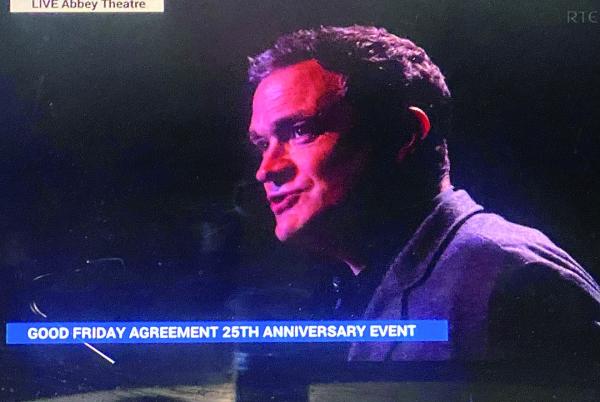June 15, 2023

Patrick Radden Keefe, a Dorchester native and the best-selling author of “Say Nothing: A True Story of Murder and Memory in Northern Ireland,” was invited to offer remarks at a ceremony at the Abbey Theatre in Dublin, Ireland, on April 2 during an event marking the 25th anniversary of the Good Friday Agreement that brought about a ceasefire and a relative peace in Northern Ireland. Following is what he said:
I’m here on behalf of an uninvited guest: the Past. The Good Friday Agreement was a diplomatic miracle. But it was a forward-looking miracle. It was about turning the page and forging a better tomorrow. So, perhaps inevitably, it did not dwell much on the past. I say inevitably, because if what to do about the past had been on the table a quarter century ago, then we wouldn’t all be here this evening. Because the negotiators could never have come to an agreement.
Who should be held accountable for a shared history of violence? Who should be prosecuted? Who should receive amnesty? What do you do when the state has colluded in violence? Should we hold the army and the police to a lower standard than the paramilitary groups – or to a higher one? What do you do when you don’t know who killed your loved one? Or where he’s buried? Or if she suffered before she died?
There was never any Truth and Reconciliation process in the North. No mechanism for getting to the bottom of what really happened over those three decades. Again, this should not be surprising: the conflict ended in a stalemate. I once asked a former Republican prisoner why there’d never been a truth process for the Troubles like there was in South Africa, and he smiled and said, “Because in South Africa there was a winner.”
Is silence the price of peace? The peace has endured now for as long as the Troubles themselves. But the peace process still feels incomplete. It’s a very chilly peace. I was in Belfast last weekend and sat with a man who lost a close relative to the violence. This happened fifty years ago. Before I was born. But to him it is still as raw and agonizing as if it happened yesterday. You’ve got a whole generation of people who are traumatized by what they experienced, and saw, and lost. And people don’t talk about it, for the most part. I wrote a book about the Troubles. It’s called “Say Nothing.”
And when I do events in the North, a lot of the people who come up to talk with me after are young people who grew up in peacetime. Ceasefire babies. “My parents lived through all this,” they tell me. “But they never talk about it.” So, there’s this younger generation that should be free of these pathologies. Free to move on. They should be the beneficiaries of the Good Friday Agreement. Yet they, too, are dogged by the past.
It’s not just the victims, either. It’s the perpetrators, too. A lot of people who joined the IRA did so for idealistic reasons. They wanted to see a United Ireland. Then, in the name of that political aspiration, they did terrible things. Unspeakable things. They justified the bombings and the maimings and the shootings as means to an end. But when peace came,
there was no victor. The island was still divided. And this left them wondering, if this was where we were going to end up, then why did I do those unspeakable things? If you never achieve the glorious end that was supposed to justify the awful means, then where does that leave you? We tend to talk about trauma as something experienced only by the victims of violence. But the perpetrators of violence experience a special trauma of their own.
We’re here to celebrate, as we should, and none of what I’m saying is meant in any way to diminish the extraordinary achievement of Good Friday. But I don’t think silence should be the price of peace. Or that it can be. A history of violence doesn’t go away just because you choose to ignore it. Remember that line by William Faulkner: “The past is never dead. It’s not even past.”
I don’t pretend to have the answer, and any concrete proposal has proven to be controversial for one constituency or another. But I firmly believe there must be some mechanism for confronting what happened during the Troubles. Because without it, the past will continue to haunt the North. It’ll haunt this island. And in a subtle way, it will form a dissonant, telltale heartbeat, faint but audible, beneath the music of daily life, and the merriment of commemorations like this.

